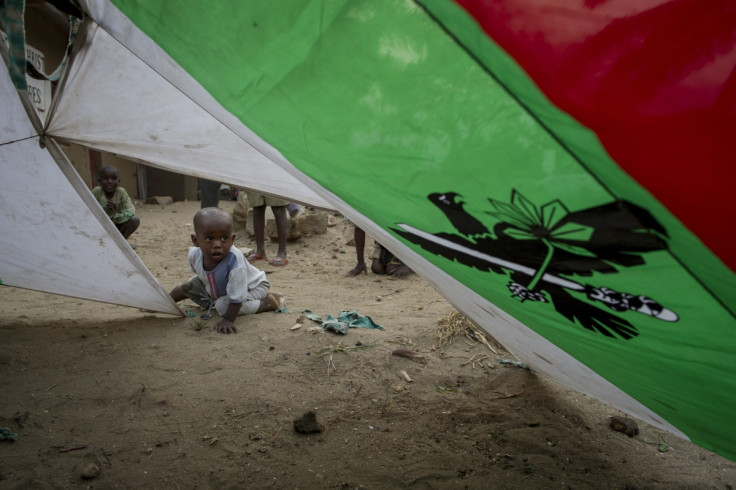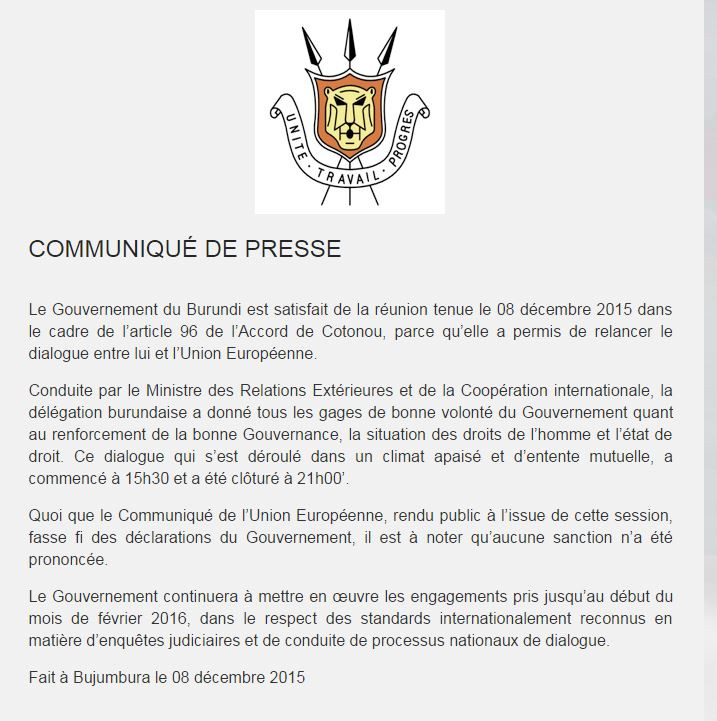Burundi: Government faces aid cuts as EU says it is not satisfied with response to rights abuse

The council of the European Union (EU) may soon impose sanctions on Burundi after the bloc said it was not satisfied with Burundian ministers' commitment to human rights, democratic principles and the rule of law.
In November the EU called Burundi for consultation to find solutions to the growing human rights violations and the political crisis in the country under the Article 96 of the Cotonou Agreement (see box), following what witnesses called a 'deadly' government crackdown on opposition members. More than 240 people have died since April when President Pierre Nkurunziza launched a controversial bid to prolong his term in office, with corpses appearing on a near-daily basis.
What does the Cotonou agreement say?
- A partnership agreement between the African Caribbean and Pacific states and the EU
- Article 96 outlines that consultations should arise if a signatory country breeches human rights or fails to achieve good governance
- Breeches can lead to "the cessation of aid and development co-operation"
- If no satisfactory resolution to the differences can be found, the EU can take "appropriate measures", such as more or less serious sanctions.
Consultations looking at whether the tiny east African nation can continue receiving EU aid ended on Tuesday (8 December), after the EU highlighted a number of shortcomings including the arrest of hundreds of protesters, the closure of private media houses and the freeze of bank accounts of non-governmental organisations.
Burundi also failed to implement a genuine and inclusive dialogue based on the Arusha Accord, a political framework widely attributed with having brought Burundi out of its 1993–2005 civil war, as previously outlined by the Peace and Security Council of the African Union (AU) of 17 October and 13 November.
Sanctions aimed at cutting foreign aid
As a result of these failings, the EU warned in a statement it would take "precautionary measures" regarding "the ongoing co-operation activities and limiting new co-operative activities of a humanitarian nature". In other words, the EU has threatened Bujumbura with pulling the plug on foreign aid, which account for 50% of the state budget.
The EU also said it "appropriate measures" would then follow, if the Burundian government fails to engage in a dialogue with representatives of the opposition and the civil society.

Regional efforts to calm Burundi's crisis have flopped, despite calls by the AU and regional east African states for dialogue. The Intra-Burundi Dialogue Commission (CNDI), established recently by Nkurunziza in a bid to return the country to stability, has been unable to run its programmes due to lack of funds.
In spite of the threat of sanctions, the Burundian government said in a statement (see left) it was "satisfied" with the consultation as "it enabled to resume the dialogue between the government and the EU".
The presidency insisted that "no sanctions has yet been pronounced", adding that it would "continue to make every effort to keep its engagements until the beginning of February 2016, in the respect of international standards recognised in terms of judicial investigations and process of national dialogue".
In October, the EU announced it was imposing travel restrictions and asset freezes against four individuals it accuses of "undermining democracy" and blocking efforts to resolve the political crisis – including three high-ranking security officials and a putschist who lead a coup d'etat against Nkurunziza on 13 May.
Release of 100 protesters
Meanwhile, as ministers gathered in Brussels, nearly 100 Burundian protesters who opposed Nkurunziza during months of violence in Bujumbura were released from prison, in an apparent act of good faith.
However Deo Ruberintwari, the interior ministry's permanent secretary, said the release of 97 prisoners "has no connection with the consultations under way".
Activists and human rights groups said many of the protesters were beaten while in prison, but officials denied the allegations.
© Copyright IBTimes 2025. All rights reserved.






















